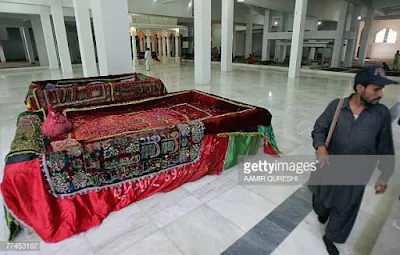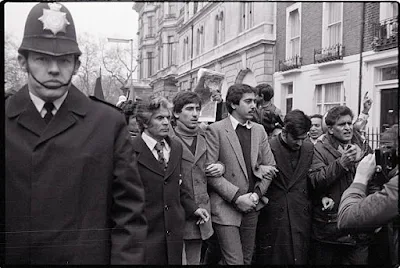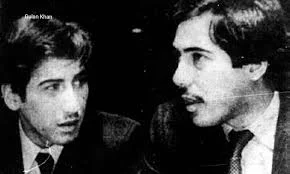Thursday, January 31, 2019
Murtaza Bhutto The Beginning of Divide in Bhutto Family
There was great urgency at the other end of the line. A shootout had been reported near Zulfikar Ali Bhutto’s mansion, 70 Clifton, and the editor of Kawish, a Sindhi-language daily, wanted the pictures. When photographer Zahid Hussain arrived at the crime scene, it was eerily quiet, and dark. The street lights on Shahrah-e-Iran had been turned off. The spot of the shooting, 100 meters from the Bhutto gate, cordoned off by armored police vehicles. Hussain could make out the bodies, strewn across the street. He saw policemen gaping at a blue SUV. “They got him,” Hussain said to himself, with a mixture of incredulity and anger, after he recognized the bloodied passenger in the front seat. Hussain gathered himself and started stealing snatches of the scene. His camera flash alerted police to the growing presence of photographers and reporters at the scene. They started smashing cameras and rounding up the reporters. Hussain darted into a dark side alley, shaken and shocked.
There are eerie similarities between Murtaza Bhutto’s assassination in Karachi on Sept. 20, 1996, and his sister Benazir’s on Dec. 27 in Rawalpindi 11 years later. Both siblings died in an SUV, both were the bane of Pakistan’s permanent establishment led by the Army and its intelligence agencies, and in both cases, the crime scenes were washed away hastily before key forensic evidence could be collected. It is no less uncanny that when Benazir ended her self-exile and landed in Karachi on Oct. 18, 2007, the street lights before Karsaz were mysteriously flicked off before two blasts tore through her homecoming procession, killing at least 146 people.
“When I saw him there in the car, I remembered Benazir’s words,” photographer Hussain told us, “that the military and civil establishment were after their family. First Zulfikar, then Shahnawaz, and now the one remaining brother had been shot too.” Forty-five minutes after the shooting, Murtaza was taken to Mideast Hospital. Hussain photographed him there, lying on a gurney in the lobby, awaiting medical attention. “I saw him trying to sit up, but he was unable to,” says Hussain. They took him in for surgery, but by that time Murtaza had already lost too much blood. He was 42.
Murtaza’s sister, who was then prime minister, and her husband, now President Asif Ali Zardari, were accused of complicity in Murtaza’s assassination. The then president, Farooq Leghari, sacked Benazir’s government 45 days after the killing, insinuating that it was one of the reasons for the ouster. “For him, Murtaza’s death was killing two birds with one stone,” said Hussain of Leghari, who died last year. “It got rid of Murtaza, who was difficult to control, and it implicated Benazir—in a murder case.” Hussain had been covering Murtaza since the Bhutto ended his 16-year self-exile and returned to Pakistan in 1993. Hussain says he liked Murtaza, despite his aggressive, often reckless behavior.
A Haughty Man
Some of this aggressive behavior was on the show just hours before the shooting. At 70 Clifton, a visibly enraged Murtaza railed against the police and his sister’s government, which he and his mother, Nusrat, frequently accused of unprecedented corruption that had besmirched and damaged the Bhutto brand name. If Murtaza sometimes treads delicately about his older sister, he had no such reservations about her husband. A popular and very likely apocryphal account has Murtaza confronting Zardari and shaving off his mustache, an insult in Sindhi culture. Zardari was seen as having a motive to get rid of Murtaza, who presented himself as the true (male) heir to Zulfikar Ali Bhutto’s political legacy, and he was charged with involvement in the murder. At this last press conference, Murtaza accused Benazir’s government of ordering the arbitrary arrests, and killings, of workers from his renegade PPP splinter group. Murtaza challenged the police to arrest him if they dared.
“I want to tell Zardari,” Murtaza told the press, “that this isn’t the Peoples Party in which you are seated: a corrupt Peoples Party, a weak Peoples Party, a shameless Peoples Party … Every other day you say you want to arrest me, come if you have the guts, you shameless people, come arrest me, I am standing here!” His final flourish was prescient: “[I am not] afraid of your CIA or your police, you just don’t have the guts to arrest me!” Hours later, he was dead.
Two nights before he was gunned down, Murtaza, who was an elected member of the Sindh Assembly, raided a couple of police stations in Karachi flanked by a dozen heavily-armed loyalists in an unsuccessful attempt to extricate a party member detained on charges of terrorism. He forced police to surrender their weapons and ordered his men to search the stations. Murtaza’s imperiousness and haughty air of entitlement outraged many people. These grating personality characteristics only strengthened the public’s unfavorable impression of him as a man who sees himself above the law. Authorities suspected the involvement of his Al-Zulfikar guerilla group in two recent bomb attacks in Karachi.
The group, modeled after the Palestinian Liberation Organization and set up to avenge Zulfikar Ali Bhutto’s hanging in 1979 by Islamist dictator Gen. Zia-ul-Haq, was accused of anti-State activities, including the 1981 hijacking of a Kabul-bound PIA flight, an abortive rocket attack on Zia’s plane, political killings (including the apparently accidental assassination of Chaudhry Zahoor Elahi, the father of Pervaiz Elahi, a former Punjab chief minister and currently a cabinet member in the Zardari-led government), bank robberies. According to the late Raja Anwar, a reformed member of Al-Zulfikar, the group was founded in Kabul and received arms and funding from the Dubai royal family, the PLO, Syria’s Assad, Libya’s Gaddafi, and India. In her book Songs of Blood and Sword, Murtaza’s daughter, Fatima, claims the guerilla group was formed after Zulfikar Ali Bhutto suggested it to Murtaza in a letter from jail.
A Family Affair
Murtaza’s cousin Tariq Islam disputes the claim. Murtaza had asked Islam to fly to Pakistan and deliver two messages to his father. On March 27, 1979, Islam told his jailed uncle that Murtaza wanted his sanction to wage a guerilla war from Afghanistan against the Zia dictatorship. The second message was PLO chief Yasir Arafat’s offer to spring Bhutto from jail. The former president and prime minister vetoed both ideas. “Did I send Mir to Harvard and Oxford to learn about all this stuff? Already they are calling me a murderer and a smuggler. Next, they will be calling me a terrorist. Tell him that I forbid him to go to Kabul. No matter what happens to me, he should concentrate on his studies,” Islam recalls Zulfikar as saying.
Murtaza exhorted Islam to try again. Islam met Zulfikar again on March 30, and again the message was the same. “I think Mir has boxed himself into a corner. He has made some commitments to the Afghans and is finding it difficult to back out now. Tell him to go if he wishes but I am not at all happy. The Afghans are too shrewd … they will manipulate Mir for their own reasons and sell him down the river when it suits them. He must be very careful in what he does and says. I leave him in God’s hands. But ask him to complete Oxford,” recalls Islam of his last conversation with Zulfikar, who was hanged less than a week later.
Sanam, the only one of Zulfikar and Nusrat Bhutto’s surviving children and who lives in London, supports her cousin’s position. “My father, from his jail cell, quite directly and forcefully ordered all four of his children to return to school and finish our educations. My parents put us on a plane and told us no matter what happens we were to stay on board until it left and return to our universities,” she wrote in Dawn last year. “My father never told any of us, his sons or his daughters, to start a terrorist wing, to hijack planes, to murder passengers or to be violent in any way. My sister chose to avenge his death through the ballot, and my brothers may have chosen a different path, but the wishes of my parents were quite clear.”
His alleged involvement with terrorist activities kept Murtaza away from Pakistan, even after Zia’s sudden demise in a mysterious plane crash and his sister being elected prime minister in 1988. In a TV interview in 1995, Murtaza said he had been “kept away” from the country. “I was told my life was not safe and that if I returned I would jeopardize the political standing of my sister,” he said. “I could not forever base my politics on the remote possibility that it would hurt my sister’s politics.” He went on to describe Benazir’s government as “directionless … corrupt to the core. Its only purpose seems to be to earn money by hook or by crook.” Their mother, Nusrat, did not hold back either. “If we are asking for democracy, why don’t we have democracy in the party?” she told the interviewer, a young Fatima sitting close by.
By the time Murtaza ended his self-exile, the row between Benazir and their mother was an open secret. Jugnu Mohsin, one of the country’s most powerful satirists, even started a column on the theme, Mommy and Me, for The Friday Times. “Unfortunately, Murtaza and Benazir and Asif’s was a difficult and, at times, turbulent relationship,” Islam told Newsweek Pakistan. Murtaza landed in Karachi almost a month after Benazir was elected prime minister for the second time, in 1993. The numbers that came out to greet him at the airport were considerably fewer than those who received Benazir in 1986. The police beat them back. The aircraft was directed to a less crowded runway and Murtaza was arrested, kept in solitary confinement for seven months on terrorism charges. Benazir had warned Murtaza from returning to Pakistan fearing, say her supporters, for his life. Murtaza’s camp maintains it was because she felt threatened by him.
Himalayan Grief
Ghinwa, Murtaza’s widow and Fatima’s stepmother, blamed Benazir and Zardari. She was only able to get the official police case registered against Murtaza’s killers two days after Benazir’s government was dismissed. The first-information report states that the “federal and provincial government of Sindh, jealous of his rising popularity had conspired to eliminate him and, in league with the accused police officers … and one Maj. Masood Sharif, a senior officer of Intelligence Bureau, have cold-bloodedly murdered Mir Murtaza.” Newsweek Pakistan contacted Ghinwa Bhutto for this story. She declined to comment citing security fears.
Estranged niece Fatima, who is half-Afghan and was born in Kabul during her father’s days of exile, has accused Benazir of “moral responsibility” for her father’s murder. Despite the family tensions and polarization within the party, even the most hardened Murtaza acolytes now concede that Benazir had no involvement in her brother’s assassination. Even though Fatima has derided and dismissed Benazir’s grief as choreographed drama, it was all too apparent that Benazir was shocked and reeling from yet another violent death in her family. State television aired footage of Benazir at Murtaza’s hospital: her head uncovered, her feet bare as a mark of respect, the prime minister too upset to even stand up straight. At the post-burial rituals in Larkana, a red-eyed and shaken Benazir sat next to her mother; the old tensions between them still showing. Benazir said hidden hands had “killed a Bhutto to get a Bhutto.”
Assassinations in Pakistan are puzzling affairs, always unresolved and unexplained. Benazir wanted to know the truth. She hired a team of British investigators, paying them £200,000 from federal funds to probe the Murtaza murder. Their report, released in spring 1997, referred to the “grassy-knoll syndrome” and justified Benazir’s suspicions. According to ballistics reports, said investigators, there was another shooter on the other side of the road who triggered the firefight. After her government fell in 1996, Benazir alleged that members of the police and Murtaza’s security detail had been planted by Inter-Services Intelligence. The shooting and deadly firefight were preplanned so Murtaza could be murdered, she said. Shortly before her own assassination, Benazir gave an emotionally-charged interview to Business Plus in which she spent considerable time going over her personal quest for answers. Murtaza’s brutal death had affected her deeply, and she never gave up her search for the truth. Benazir’s own assassination was probed by Scotland Yard, who bizarrely sanctified the then government’s “lever theory” explaining away Benazir’s death, despite cell-phone footage to the contrary.
Source http://wikiexpress.blogspot.com/2014/10/who-killed-murtaza-bhutto-in-pakistan.html
Subscribe to:
Comments (Atom)
































































